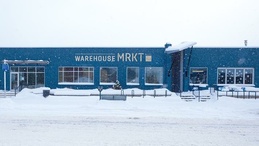
Making the Switch to Refill
Your guide to reducing single-use products
By Hanna Lee-Kleb | Aug. 31, 2024
In a world increasingly aware of environmental concerns, many people are seeking practical ways to reduce their plastic footprint. Switching from single-use products to refillable ones is a powerful step in that direction.
Two northern Michigan companies are leading the charge: The Refillery and Truly Free. These businesses not only offer refillable options but also focus on providing products with natural ingredients, making them safer for homes and families. We caught up with them to learn more about shopping sustainably, reading the ingredients label, and finding powerful products for the home, bodycare, and more.
Meet the Experts
Sarah Lange, owner of The Refillery, has seen her business grow by leaps and bounds in the past decade. The Refillery’s new, larger store in Traverse City’s Warehouse MRKT, alongside their original space in The Mercato at The Village at Grand Traverse Commons, offer a wide variety of refillable and eco-friendly products. You’ll find cleaning solutions, hand soaps, face wash, toothpaste, shampoo, and everything in between.
Truly Free is committed to the products you use for laundry, cleaning, and keeping your home running smoothly (dish towels, sponges, etc.). They too have recently invested in new digs with a significant build-out in Acme near Grand Traverse Resort and Spa to enhance their ability to provide sustainable and natural products to a broader audience across the country.
Stephen Ezell, owner of Truly Free, sees the refillable products market continuing to grow, with more major brands and movements embracing the refill model. He believes that as awareness increases about the limitations of recycling and the environmental impact of plastic, more people will turn to refillable options. “The shift is happening, and we’re excited to be a part of this movement,” he says.
Meanwhile, Lange is focused on expanding The Refillery’s offerings and collaborating with local businesses and Airbnb hosts to provide refillable products. She also envisions participating in farmer’s markets to make refilling even more accessible. “We hope to be a part of people’s regular routines, making it easy and convenient to refill while supporting local,” Lange says.
Step One: What’s In Your Cleaning Cabinet?
The journey to a more sustainable lifestyle begins with assessing the products currently in your home. First, do you use all the products you have? And second, what’s inside them?
Many conventional household products contain harmful chemicals that can be detrimental to both your health and the environment. Your shampoo or go-to cleaning spray might have a dozen or more ingredients on the back of the bottle, including dyes, parabens, or phthalates.
Lange suggests scrutinizing ingredient lists for terms like “fragrance” or “parfum,” which can be a mixture of dozens of chemicals causing skin irritation or other health issues.
“Sulfates are another ingredient that is best to avoid. We have been led to believe that bubbles or lather mean clean, but they can be an irritant to skin, eyes, and mucus membranes,” Lange explains. Instead, she recommends opting for safer, budget-friendly alternatives such as vinegar, baking soda, and hydrogen peroxide.
Step Two: Find Your Go-To Containers
Once you know what products you have at home (and which ones should be upgraded to something greener), it’s time to find containers for refilling. The most sustainable container is the one you already have.
Lange says, “We have customers bring in empty plastic laundry jugs, mason jars, growlers, even old paper coffee cups. As long as the container is clean and dry, we will fill it!” For those starting fresh, The Refillery also offers a variety of containers for purchase.
Truly Free takes a different approach by delivering products in bulk or in concentrate forms that you can mix with water in your existing bottles. “Our model not only reduces plastic waste but also offers convenience by delivering long-lasting, eco-friendly products right to your doorstep,” Ezell says.
Step Three: Make Refilling Part of Your Routine
Jumping on the refill bandwagon can feel daunting at first when you have to add another item to your to-do list, but there are ways to make it easier. Lange recommends having two containers for frequently used products so you always have a backup.
“I love using empty Bailey’s Kombucha bottles for hand soap because our pumps fit right on there. Once my hand soap starts getting low, I can bring in my clean one and fill it up,” she says.
Lange also suggests starting with one or two products, such as laundry detergent or hand soap, and gradually expanding your refillable collection as you get in the swing of things. She tells us it can be helpful to try small amounts of new products before committing to larger quantities, lest you get stuck with something you don’t love.
Ezell points out the convenience of Truly Free’s delivery model, which eliminates the need for frequent store visits. “Our products are designed to be long-lasting, reducing the frequency of refilling and making the switch more seamless for busy households,” he adds.
He tells us about a customer who was initially skeptical but has now fully embraced the refillable lifestyle. “It’s amazing to see the positive impact on our customers’ lives and the environment,” he says. According to Ezell, Truly Free’s model has saved almost 17 million pieces of plastic from being produced. Lange highlights that only 9 percent of plastic is actually recycled, making the need for refillable options even more critical.
Additionally, refillable products often come from companies that prioritize sustainability and ethical practices. The Refillery, for example, works with closed-loop companies that sanitize and reuse their containers, further reducing waste. These companies also tend to pay their staff livable wages and focus on producing high-quality, concentrated products that offer more value for money.
“Not only are you saving numerous containers from being sent to the landfill, but you’re also supporting businesses that are committed to sustainability,” Lange concludes.
Trending

Farm to Glass with Ethanology
When Elk Rapids distillery Ethanology committed to locally-sourced ingredients for their products, it seemed like they&rsquo… Read More >>
MRKT HLDY SHPPNG, aka Warehouse MRKT Holiday Shopping!
Shop the latest from local makers and vendors at the Holiday MRKT Share at Warehouse MRKT in TC, Saturday, Dec. 20, from 10a… Read More >>
Men and Ugly Sweaters
Those two things don’t always go together, but on Dec. 19, you’ll see both out and about in Petoskey and Harbor … Read More >>


